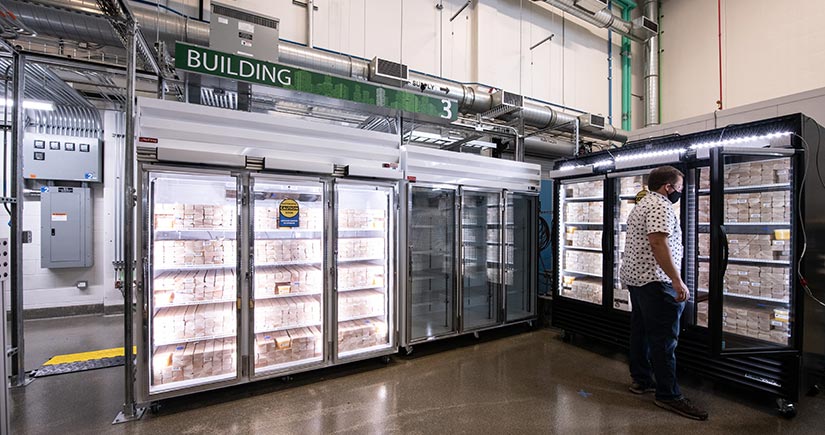Commonwealth Edison Company and Emerson Electric Partnership
A new low global warming potential (GWP) collaboration with NREL, DOE and Commonwealth Edison Co. and Emerson Electric revealed up to 62% energy savings for high-use grocery and convenience store refrigeration units.

In partnership with Commonwealth Edison Co. (ComEd), the Building Technologies Office and NREL worked to find a solution to a common energy burden at convenience stores and small supermarkets—high-traffic refrigerated display cases with glass doors. The cases consume roughly 931 W of power and 11 kWh of energy per day. These cases must provide a consistent product temperature of 36–40˚F (~2–4˚C) to maintain food safety and quality, despite the doors being repeatedly opened and closed by customers.
Leveraging NREL's world-class research laboratories, the team evaluated the impacts of energy-efficient refrigeration technologies, including advanced defrost controls coupled with refrigerants that are thermodynamically efficient and have low-GWP. The research findings emphasize the energy savings found in new case models that contain low-GWP refrigerants, especially as the U.S. Environmental Protection Agency and state governments initiate a phase-down of common hydrofluorocarbons (HR Act 133, California SB 1383).
The research from this partnership shows that, even if a drop-in refrigerant with similar thermodynamic properties to a hydrofluorocarbon is used, refrigerated display cases with tight tolerances for product temperatures can show reduced demand by 33% through upgraded energy-efficient components, such as lighting, panel insulation, high-efficiency evaporator and condenser fans, and high-effectiveness heat exchangers. The study also showed savings between the various cases under changing indoor environmental conditions throughout the year.
The promising findings from this research will pave the path for adoption of low-GWP refrigerants in refrigerated display cases across the nation, supporting ambitious climate goals.
Contact
Share

